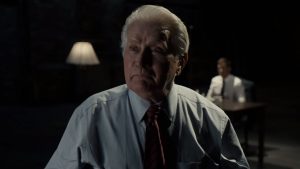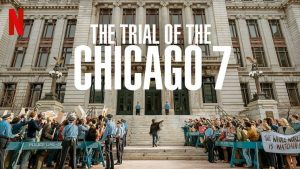The “West Wing” reunion special on HBO Max is very well done, thanks to a cast that still fits perfectly into the characters, with direction from Thomas Schlamme that evokes the quality of the original.
Aaron Sorkin’s script, “Hartsfield’s Landing,” originally produced for the show’s third season, still crackles. Though produced on a theater stage with coronavirus protocols, minimalist sets, and less room for the infamous walk-and-talks, the cameras still capture the drama — and those round pools of light that filled the hallways of the White House from 1999 to 2006. In addition to Martin Sheen, Allison Janney, Bradley Whitford, Janel Maloney, Dulé Hill, Richard Schiff, and Rob Lowe, it’s good to see some of the non-starring actors invited back to play their recurring characters, too.
The interstitial material (which includes other cast members and a few surprises) that fills the act breaks promotes When We All Vote, a campaign to get more people to the polls, but I doubt there are many who seek out this “West Wing” special that aren’t planning to vote (or have done so already).
Still, it was nice to return to the fictional fantasy of a White House filled with competent personnel doing their best to make the country better.
As a fan who saw every episode of “The West Wing” in its original run on NBC, and then watched it all the way through again when my daughter was old enough to enjoy it, I approve this message by giving it an 8.5 out of 10.
How do you condense a trial which lasted over six months, filling 21,000 pages of transcripts, into a two-hour movie?
First, you call Aaron Sorkin. That’s what Steven Spielberg did a decade ago when he wanted to tell the story of “The Trial Of The Chicago 7.” Sorkin agreed, but the project kept getting pushed aside because they each had other obligations. Finally, Sorkin had the time to get it done, but by then, Spielberg’s interests lay elsewhere. So, he gave the whole thing to Sorkin to oversee as both writer and director.
The result is a very entertaining look back at a courtroom circus from 1969 that uses some of the actual words spoken by the participants, as well as the usual Sorkin dialogue enhancements.
The trial regards the actions of several activists who traveled to Chicago in the summer of 1968 to lead protests outside the Democratic National Convention. Thousands of people filled Grant Park and nearby streets, exercising their First Amendment rights to speak out against the Vietnam War, the Lyndon Johnson administration, and Vice President Hubert Humphrey, who was to be the party’s candidate. Chicago Mayor Richard J. Daley did not want his city’s image tarnished, and ordered his cops to clear out the demonstrators and keep them away from the hotel that was home to the convention — and the TV cameras based there.
Eventually, there was a clash, which each side claimed the other started. But it was hard for any objective observer to see what harm the unarmed protestors could do against billy-club-wielding cops, who saw an opportunity to beat the crap out of the hippies (a term they applied to everyone under 30). Meanwhile, reporters and photographers were drawn to the scene and captured much of the mayhem as the protestors chanted, “The whole world’s watching! The whole world’s watching!”
In the aftermath, LBJ’s Justice Department opted not to charge any of the activists. But once Richard Nixon got into office, Attorney General John Mitchell had a different attitude — he wanted to show who was the boss, that this administration stood for “law and order.” This may sound to you as if Sorkin tore the story out of this year’s headlines, with police and national guard moving in on Black Lives Matter protestors in American cities, but that’s just history repeating itself.
Sorkin has made all of the characters multi-dimensional, with much credit going to the cast. At the defendant’s table, Eddie Redmayne is Tom Hayden, Sacha Baron Cohen is Abbie Hoffman, Yahya Abdul-Mateen II is Bobby Seale, John Carroll Lynch is Dave Dellinger, and Jeremy Strong is Jerry Rubin. Mark Rylance puts on a helluva performance as defense attorney William Kunstler, while Joseph Gordon-Levitt plays the prosecutor. Michael Keaton has a small role as former Attorney General Ramsey Clark. And Frank Langella gives another one of his scene-stealing performances as Judge Julius Hoffman (no relation to Abbie), who appears to have made up his mind about these young troublemakers before the opening statements.
One quick note about Cohen. Along with the Netflix series “The Spy” from last year, “The Trial Of The Chicago 7” shows his ability to play non-comedic characters, not just his goofier alter egos (e.g. Borat, Ali G). Abbie Hoffman wasn’t exactly the straightest arrow in the quiver, more prone to attention-getting stunts (like calling his memoir “Steal This Book,” which many of his followers did), but Cohen disappears into his skin quite well.
The movie isn’t confined to the courtroom. There are flashbacks to the planning, both of the protests and their defense, as well as the bedlam in the street. We see Abbie Hoffman — out on bail, like his fellow white defendants, while Seale (who had nothing to do with any of this) is kept behind bars — performing on stage each night to offer his version of what happened in court that day. We see how the FBI infiltrated the activists by planting agents among them, including one who gets Rubin to fall for her, unaware that she’s keeping tabs on him and his colleagues.
All in all, “The Trial Of The Chicago 7” is another Sorkin success. For viewers who don’t know the story, the movie will serve as both entertainment and a history lesson. For those who do, it will remind them that America does not learn from its mistakes.
I give “The Trial Of The Chicago 7” an 8.5 out of 10.


